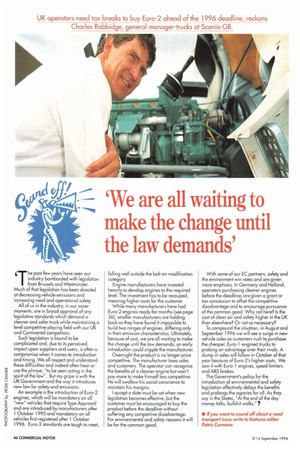fe l 'We are all waiting to
Page 48

If you've noticed an error in this article please click here to report it so we can fix it.
make the change until the law demands'
4 T
he past few years have seen our industry bombarded with legislation from Brussels and Westminster. Much of that legislation has been directed at decreasing vehicle emissions and increasing road and operational safety. All of us in the industry, in our saner moments, are in broad approval of any legislative standards which demand a cleaner and safer truck while maintaining a level competitive playing field with our UK and Continental competitors. Such legislation is bound to be complicated and, due to its perceived impact upon suppliers and users, is often a compromise when it comes to introduction and timing. We all respect and understand these difficulties and indeed often hear or use the phrase, "to be seen acting in the spirit of the law". But my gripe is with the UK Government and the way it introduces new law for safety and emissions. An example is the introduction of Euro-2 engines, which will be mandatory on all new" vehicles that require Type Approval and are introduced by manufacturers after 1 October 1995 and mandatory on all vehicles first registered after 1 October 1996. Euro-2 standards are tough to meet, falling well outside the bolt-on modification category.
Engine manufacturers have invested heavily to develop engines to the required level. The investment has to be recouped, meaning higher costs for the customer.
While many manufacturers have had Euro-2 engines ready for months (see page 36), smaller manufacturers are holding back as they have found it impossible to build two ranges of engines, differing only in their emission characteristics. Ultimately, because of cost, we are all waiting to make the change until the law demands; an early introduction could cripple the manufacturer. Overnight the product is no longer price competitive. The manufacturer loses sales and customers. The operator can recognise the benefits of a cleaner engine but won't pay more to make himself less competitive. He will swallow his social conscience to maintain his margins. I accept a date must be set when new legislation becomes effective, but the customer must be encouraged to buy the product before the deadline without suffering any competitive disadvantage. For environmental and safety reasons it will be for the common good. With some of our EC partners, safety and the environment win votes and are given more emphasis. In Germany and Holland, operators purchasing cleaner engines before the 'deadlines are given a grant or fax concession to offset the competitive disadvantage and to encourage pursuance of the common good. Why not here? Is the cost of clean air and safety higher in the UK than elsewhere? Or not so necessary? To compound the situation, in August and September 1996 we will see a surge in new vehicle sales as customers rush to purchase the cheaper, Euro-l-engined trucks to prolong an advantage over their rivals. A slump in sales will follow in October of that year because of Euro-2's higher costs. We saw it with Euro-1 engines, speed limiters and ABS brakes.
The Government's policy for the introduction of environmental and safety legislation effectively delays the benefits and prolongs the agonies for all. As they say in the States, "AI the end of the day money talks, bullshit walks."




























































































